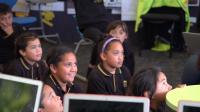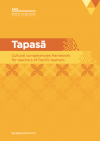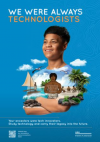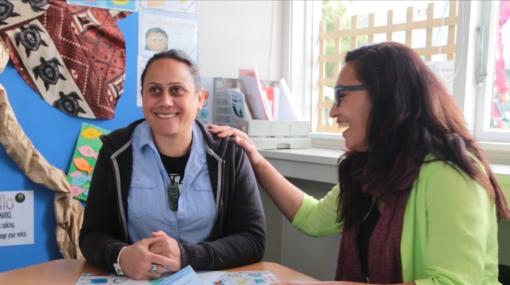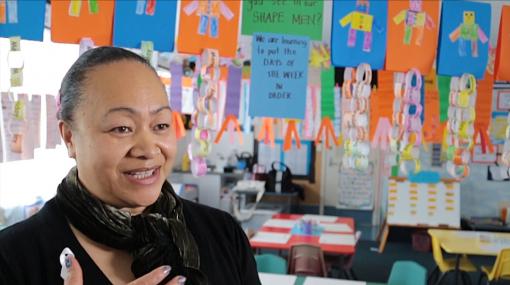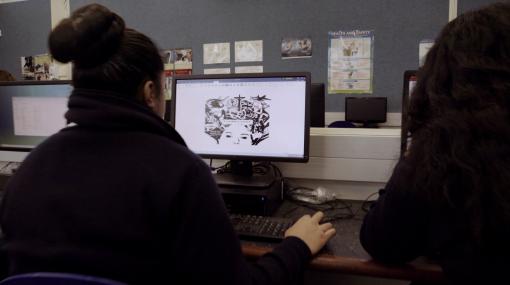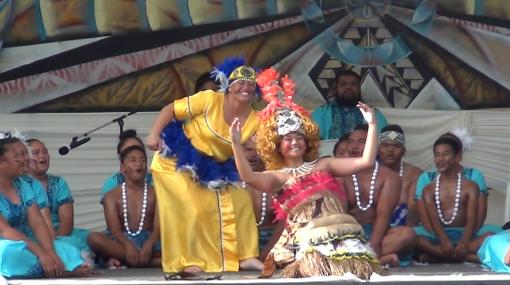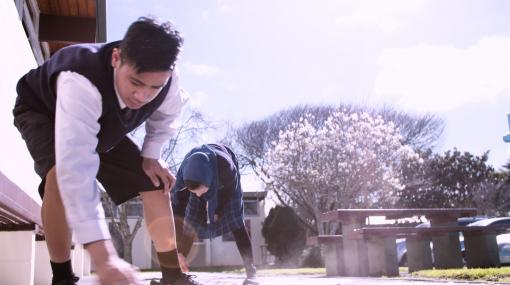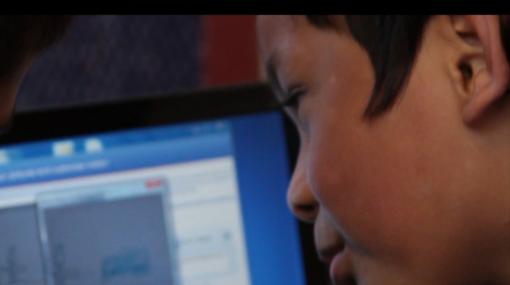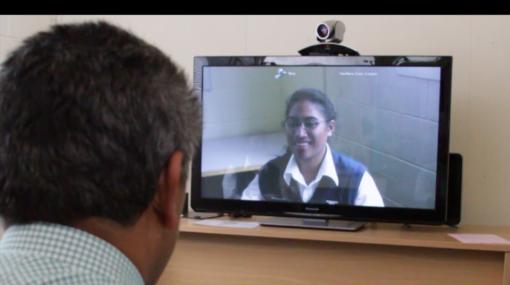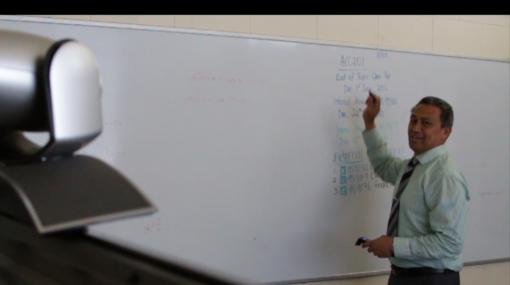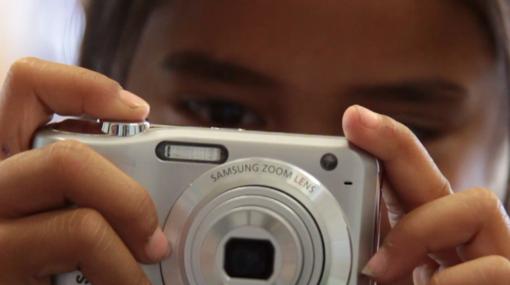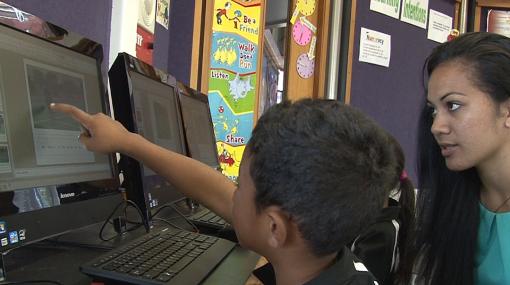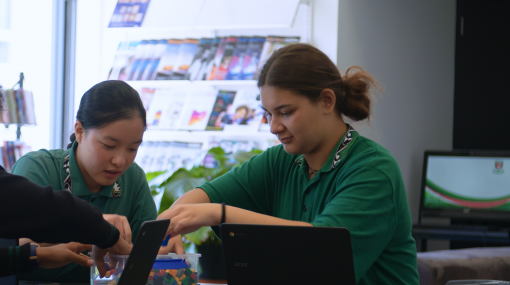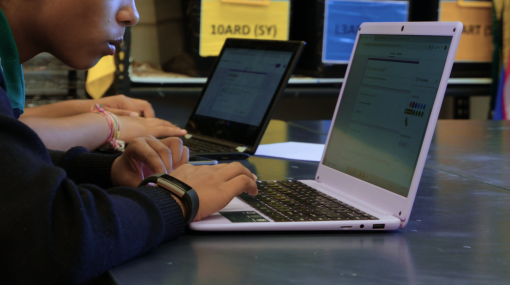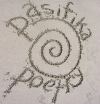Using digital technologies to support Pacific learners
Successful learning for Pacific students
Successful learning for our Pacific students is founded on their languages, cultures, and values. It builds on what we know to be effective curriculum and pedagogy in the different cultural contexts that our learners from the Pacific Islands identify.
The Action Plan for Pacific Education explains the importance of connecting and responding to the identities, languages, and cultures of each community of Pacific learners in schools. Values such as respect, service, leadership, family, belonging, and relationships are important within Pacific cultures.
Tapasā: Cultural Competencies Framework for Teachers of Pacific Learners
Tapasā is a resource for all teachers of Pacific learners. It is designed to support teachers to become more culturally aware, confident and competent when engaging with Pacific learners and their parents, families and communities. It aims to contextualise quality teaching and learning within a Pacific learner setting by providing a Pacific lens to the Standards for the Teaching Profession and the Code of Professional Responsibility.
The Tapasā website provides resources, tools, and support for teachers of Pacific learners.
Tapasā: cultural competency framework for teachers of Pacific learners
The resource section on the Teaching Council website contains a suite of professional learning resources to give life to Tapasā including:
- Tapasā framework – download
- Quality Practice Template: cross sector examples for a QPT using a Tapasā lens
- Tapasā poster for your school, kura or centre – download
- Online resource bank
- Videos – Each video has conversation starters and helpful links
Plan to include all Pacific learners
Plan to include all Pacific learners by:
- knowing your Pacific students
- integrating their language and culture into the classroom environment
- providing opportunities for students to personalise learning and create successful learning pathways
- establishing relationships with parents and families to support learning.
"An effective pedagogy that is culturally responsive to Pasifika ensures that the school’s curriculum provides relevant contexts that can engage learners from different cultures.....ensures Pacific learners can draw on their own knowledge of the world and to enable success through building on activities and experiences, with which they are familiar or confident.”
Improving education outcomes for Pacific learners ERO Report, 2012
Use digital technologies to support Pacific learners
Technologies can make it easier to provide relevant and meaningful connections to students’ communities and aiga, and provide learning experiences that are designed around culture, identified needs, strengths, and interests.
Digital technologies enable teachers to:
- engage with families and communities in ways that meet student needs by drawing on culture and language
- help build relationships
- personalise learning for students
- record, review, share, and clarify progress towards learning outcomes
- show families that you care about their childrens' progress and can design learning that meets needs and builds on strengths.
Key resources
This space on Te Kete Ipurangi (TKI) provides links to student-focused information and resources to support effective teaching for Pasifika students.
This guide provides inclusive teaching and learning strategies that can be used in the classroom to create a more effective learning environment for all Pasifika students.
Where to start?
Tapasā – Cultural competencies framework for teachers of Pacific learners
A tool that can be used to increase the capability of all teachers of Pacific learners.
Tapasā resources
The Tapasā resources section of the Teachers Council website has Tapasā video resources. Each video has conversation starters, supplementary resources, and subtitles to build teachers' confidence in using Tapasā to engage with Pacific learners.
Quality Practice Template – Cross Sector Examples for a QPT using a Tapasā lens
Direct links to the Teacher Standards with supporting descriptions of quality practices and evidence you can gather to demonstrates these practices.
When designing effective learning to engage Pasifika learners, start with students’ culturally-located needs and strengths. Involve aiga and fanau in learning-focused discussions.
Including Pasifika languages into the classroom
Celebrate the languages of students in your classroom. Use the Pasifika languages resources to develop engaging learning activities where your Pasifika students see their language and culture being valued.
Lalaosalafai Tu’ua teaches at Southern Cross Campus in Mangere. He describes his experience of using video conferencing to teach Samoan at NCEA Level 3 and the opportunities this technology provides for students who would otherwise be unable to access this learning.
Create opportunities for students to plan learning that supports their long term goals. Southern Cross Campus student Shona Unasa takes economics via video conference. She shares her learning experience using this medium.
Supporting and including learners with English as a second language
Kimi Ora Community School teacher, Bridget Harrison talks about using digital stories to support students with English as a second language.
Pacific STEAM
Five short videos and downloadable posters illustrating how Pacific peoples were always scientists, technologists, engineers, artists, and mathematicians.
Use the resource to encourage students to study STEAM subjects and carry their ancestors' legacy into the future.
Develop your teaching practice
Use a teaching as inquiry framework to examine your classroom practice and identify strategies and approaches that make a difference for Pasifika students.
NZC Update 27: Using inquiry to engage Pasifika students
Read these case studies about two highly effective teachers with classes of predominantly Pasifika students and their inquiries into their practice. They focused on:
- Making meaningful connections using a language experience
- Supporting language and agency for Pasifika students
Teachers as learners: Improving outcomes for Māori and Pasifika students through inquiry
These learning materials illustrate how teachers have used an inquiry approach to teaching to become more culturally responsive and to improve outcomes for their Māori and Pasifika students.
Effective teaching for Pasifika learners
This video collection explores ways to create student-centred learning environments.
Parents supporting student learning
Some Pasifika parents have English as a second language. This can be a barrier to them engaging with and supporting their child's learning. You can support communication with Pasifika parents, aiga and communities by, providing multiple translations of important information so communities can access it. Having these available online to be printed out, sent electronically, or accessed online via your class blog or school website reduces barriers and helps parents to connect with their child's learning.
Learning advisor/coordinator, Ariana Williams explains the importance of connecting with parents to support student learning. She explains, why Sylvia Park School have translated resources like comprehension cue cards for parents to use with their children at home. This enables parents to have the prompts in their native tongue that will help them to be able to support the child at home. More information about the Mutukaroa project is in the Beyond the Classroom section of Enabling e-Learning.
Holy Cross School is very multicultural community. Principal, Kathy Moy-Low explains how they have consulted with and engaged the parent community in e-learning. One of their initiatives is after school parent technology sessions, which are run once a month. In this video clip, parents explain why they go to the classes – the benefits for their own learning with technology, and how they can engage more with their children's learning.
Finlayson Park School invite parents into the school computer lab and employ a teacher's aide employed to support parents with using computers and the Internet.
More information
School stories
Using ICT to enhance Samoan language
In this EDtalk, May Crichton discusses their process for making digital stories to create Samoan language learning resources to support and extend children’s confidence with their language. This has actively encouraged both children and their families to speak Samoan at home.
Effective teaching for Pasifika learners
This video collection on the Pasifika Education website explores ways to create student-centred learning environments.
Classroom teaching resources
The Pasifika dual language resources are designed to support the early language and literacy learning of Pasifika new entrant students in English-medium classrooms. Teacher and parent support material accompanies these resources. Many of the dual language books are available as PDFs and all the books are available as MP3 audio files. Print copies of the texts are available from Down the Back of the Chair.
Pasifika poetry
A celebration of the poetry of tagata o te moana nui, the peoples of the Pacific on the New Zealand electronic poetry centre website.
Pacific language weeks
Find dates for the current year at the Ministry for Pacific Peoples.
Rotuma resources
Gasav Ne Fäeag Rotuạm Ta - Rotuman Language Week on Tāhūrangi
This resource contains suggested activities and curated website links to help you and your learners learn about and celebrate the Rotuman language.
Facebook: NZ Rotuman Language Week
Follow the Rotuman Language Week on Facebook for discussion and updates.
Auckland Rotuman Fellowship Group Inc
Auckland Rotuman Fellowship Group Incorporated page containing resources and a calendar of upcoming events.
Gagana Samoa resources
Teaching and learning gagana Sāmoa
This resource from the Teaching and Learning Pacific Languages collection provides teachers with support for the teaching and learning of gagana Samoa through storybooks, teacher support materials, and the Poto series of books for supporting teachers to work in partnership with families and Pacific communities.
Samoan Language Week on Tāhūrangi
This page offers suggested activities and curated website links to help you and your learners explore and celebrate the language of Sāmoa.
Gagana Sāmoa website
This website lists common phrases and provides audio to help with pronunciation.
Cook Islands Māori resources
Facebook: Official Cook Islands language week
Celebrating Cook Islands Language Week.
There are five languages spoken in the Cook Islands. English and Cook Islands Māori are the official languages (except on Palmerston where only English is official).
The other languages are:
- Pukapukan – from the island of Pukapuka, which is geographically and linguistically closer to Samoa
- Rakahanga/Manihiki – spoken on the islands of the same name
- Tongarevan – spoken on the island of Penrhyn.
Teaching and Learning Cook Islands Māori
This resource from the Teaching and Learning Pacific Languages collection provides teachers with support for the teaching and learning of Cook Islands Māori
What's on – Cook Islands Language Week – Te ‘Epetoma o Te Reo Kūki ‘Āirani
Listen to Cook Islands Māori words and greetings and read Cook Islands Māori online storybooks.
Simple Cook Islands words and phrases
A downloadable PDF from the Human Rights Commission website.
Cook Islands Māori language week on Tāhūrangi
This page contains suggested activities and curated website links to help you and your learners learn about and celebrate the languages of the Cook Islands.
Faka Tonga resources
Teaching and learning lea faka-Tonga
This resource from the Teaching and Learning Pacific Languages collection provides teachers with support for the teaching and learning of lea faka Tonga through storybooks, teacher support materials, and the Poto series of books (supporting teachers to work in partnership with families and Pacific communities).
Lea Faka-Tonga NZQA quality assured assessment resources to support internally assessed Level 1,2, and 3 registered achievement standards for Lea Faka-Tonga aligned with The New Zealand Curriculum.
Digital dialects – Tongan
Online games to help with building vocabulary and learning the Tongan language.
Tongan for beginners
A series of seven lessons for beginners learning the Tongan language.
Uike Kātoanga’i ‘o e lea faka-Tonga - Tonga Language Week on Tāhūrangi
This page contains suggested activities and curated website links to help you and your learners learn about and celebrate indigenous Tonga language and culture.
Vagahau Niue resources
All about the Rock: Niuean language week
10 things you should know about Niue from TePapa's blog.
Niuean language week
A series of Niuean heritage images from Auckland libraries.
Faahi Tapu he Vagahau Niue - Niue Language Week on Tāhūrangi
This page contains suggested activities and curated website links to help you and your learners learn about and celebrate indigenous Niue language and culture.
Teaching and learning vagahau Niue
This resource from the Teaching and Learning Pacific Languages collection of resources provides teachers with support for the teaching and learning of vagahau Niue.
Gagana Tokelau resources
Seven things you should know about Tokelau
Te Papa's blog post describes seven key facts about Tokelau.
Tokelau language week
Downloadable posters, labels and banners to decorate your classroom from Twinkl. Your students can learn greetings in Tokelauan and sing their national anthem.
Te Vāiaho o te Gagana Tokelau - Tokelau Language Week on Tāhūrangi
This resource contains suggested activities and curated website links to help you and your learners learn about and celebrate the language of Tokelau.
Tokelau language week – Te vaiaho o te gagana Tokelau
Resources and links from Christchurch City Libraries.
Teaching and learning gagana Tokelau
This resource from the Teaching and Learning Pacific Languages collection provides teachers with support for the teaching and learning of gagana Tokelau.
Tuvalu resources
Te ‘Gana Tuvalu - Tuvalu Language Week on Tāhūrangi
This page contains suggested activities and curated website links to help you and your learners learn about and celebrate indigenous Tuvalu language and culture.
Fiji resources
Macawa ni Vosa Vakaviti - Fijian Language Week on Tāhūrangi
This page contains suggested activities and curated website links to help you and your learners learn about and celebrate the Fijian language.
Learn to speak the Fijian language with Fijian online tutors, books and puzzles
A blog with simple words and phrases for everyday conversations, a Fijian dictionary, and sign-up for free lessons. Access the Fijian Phrasebook App from iTunes or Android.
Learn Fijian words
A video to help students learn the correct pronunciation of words and phrases.
Let’s Meke!
Learn about the meke, an indigenous Fijian song/dance that is performed by both men and women from the TePapa website.
Fijian language celebrated in New Zealand
In this episode from TVNZ’s Tangata Pasifika, students of Fijian descent connect with their language and cultural roots.
Resources to support teaching practice
Key resources
Action Plan for Pacific Education
The Action Plan maps the Government’s commitment to transforming outcomes for Pacific learners and families and signals how early learning services, schools, and tertiary providers can achieve change for Pacific learners and their families. The Action Plan has resources and guidance including planning templates.Tapasā – Cultural competencies framework for teachers of Pacific learners
A tool that can be used to increase the capability of all teachers of Pacific learners.Tāhūrangi - New Zealand Curriculum
Online hub for teaching resources. Use "Tapasā" as your search term.Tapasā resources
The Tapasā resources section of the Teachers Council website has Tapasā video resources. Each video has conversation starters, supplementary resources, and subtitles to build teachers' confidence in using Tapasā to engage with Pacific learners.Quality Practice Template – Cross Sector Examples for a QPT using a Tapasā lens
Direct links to the Teacher Standards with supporting descriptions of quality practices and evidence you can gather to demonstrates these practices.
Supporting Pacific learners
Inclusive teaching and learning strategies you can use in the classroom to create a more effective learning environment for all Pasifika students.
This site is part of the Pacific Virtual Museum project. It aims to empower people in and of the Pacific Islands, enabling them to explore, discover and view thousands of items held in museums, libraries, galleries, and collections around the world and to celebrate the rich and diverse cultures of the Pacific. It includes images, objects, video, audio, text, and maps.
Success as Pacific on Tāhūrangi
This section links to information and resources about learning contexts and approaches, that support Pacific students.
Pasifika language in education
This report provides a snapshot of Pasifika language in education in New Zealand Schools as at 1 July, 2012. It describes two levels of Pasifika language learning – Pasifika medium education and Pasifika language in English medium education, from Education Counts.
This literature review highlights and clarifies key evidence towards improved learning and achievement outcomes for Pasifika learners and identifies priorities for future research in Pasifika education.
Improving education outcomes for pacific learners (May 2012)
The ERO report explains that, research consistently shows that the more time students spend involved in learning activities, the more they learn and the greater their achievement. The more opportunities learners have to respond to a particular content or practise a skill, the better their understanding of the material or skill.
Making a difference to Pasifika student achievement in literacy (November 2012)
This research report from Auckland UniServices Limited explores classroom and school-related factors associated with improvements in the literacy achievement and progress of Pasifika students beyond expected levels in schools participating in the Literacy Professional Development Project (LPDP). It also identifies the nature of the professional development support that facilitated these outcomes.
Critical success factors for effective use of e-learning by Pacific learners (2006)
ITPNZ contracted a team of Pacific researchers to identify the critical success factors and pedagogy for increasing Pacific students’ access to, participation in, and achievement through e-learning.
